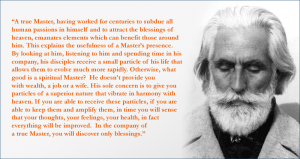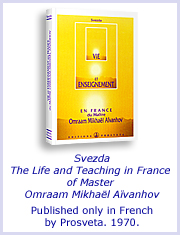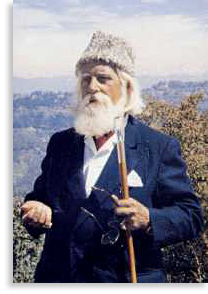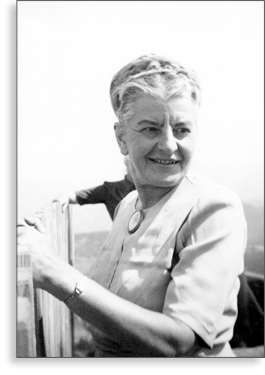What is a spiritual Master?
‘A Master is someone who has gained control, or mastery, over all of his thoughts, feelings and actions….
To achieve complete control of all one’s thoughts, feelings and actions requires the use of special methods, a special discipline and a profound knowledge of the structure of the human being, of the forces at work within him and the correspondences between his whole being (his organs and his several bodies) and the different realms of nature. To be master of oneself also presupposes a knowledge of the entities of the invisible world and the structure of the entire universe. A Master is one who has resolved all the essential problems of life, who is free, who possesses an extremely strong will and, above all else, is full of love, kindness, gentleness and light. What tremendous work, what concentrated study and perseverance it takes to become a Master!
The power of genuine Masters lies in the perfect accord between their actions and their philosophy. They are the first to practice in their own lives what they preach to others; they are living examples. And to be a living example is to be a fountainhead, a spring to which plants, animals and human beings are drawn. This is why there are always disciples around a Master.’
Omraam Mikhaël Aïvanhov,The Second Birth, Complete Works, Vol. 1, p. 182-183.
‘If you want to learn to play the violin, you buy an instrument and a book of exercises and begin practicing. For the first few days, you work for an hour or two, but very quickly this first enthusiasm wanes and you abandon your instrument. A week later you take up your violin again, and then once again you give up… And so the time passes, alternating between activity and laziness, according to your whims. But when you have a teacher, you want to win his or her approval and respect, so you work steadily to prepare for your lessons. The teacher corrects your mistakes and encourages you, and under this guidance, one day you become a virtuoso. No great musician has reached the height of his art without a teacher.
It is the same in the spiritual domain. If you don’t have a Master, it is very difficult for you to persevere. You know it would be good for you to meditate and make efforts to improve yourself, but very quickly you give way to your old habits. A few months later you remember all your good intentions and make a few more efforts… until one day you are permanently overtaken by inertia. But with a Master you are continually stimulated, continually carried along by both by his words and his example. He also touches your feelings, and because you love and admire him, you are pushed to work on transforming yourself.’
Omraam Mikhaël Aïvanhov, What is a Spiritual Master?, Izvor Collection 207, p 25-26. Translation of the audio
Testimony of Svezda
For more than forty years, Svezda fully dedicated her life to the Master Omraam Mikhaël Aïvanhov in her  official function as his secretary. Prepared from birth for her meeting with him, she had been given all necessary criteria with which to measure his greatness and recognize his teaching. She was a privileged witness of the work he accomplished daily.
official function as his secretary. Prepared from birth for her meeting with him, she had been given all necessary criteria with which to measure his greatness and recognize his teaching. She was a privileged witness of the work he accomplished daily.
In her book, The Life and Teaching in France of the Master Omraam Mikhaël Aïvanhov, written in 1970, Svezda offers this testimony:
‘On many occasions during this time I was surprised at Frere Mikhaël’s comportment. One sensed that he lived according to norms that were absolutely unusual… and I felt compelled to understand the deep spiritual reasons that dictated his actions. This is why I paid attention to his slightest gestures, in an attempt to penetrate his motives.… In both his movements and his words, one felt a gentle yet tenacious will that manifested the unmistakable presence of the spirit and a celestial harmony.
Everything was connected and consistent in the life Frere Mikhaël lived. I never found any contradiction between his life in the community, his words and his comportment at home. Living close to him for so many years allowed me to confirm this. He never advised others to do anything he had not put into practice in his own life. He never accepted the slightest personal service, even those services that are so easily and normally offered in a community setting. He alone took care of his bedroom, cleaned it and made his bed. He took charge of his own laundry as well, and did so with the greatest care.
What most struck one upon first meeting him was the intense light that radiated from him, a light imbued with gentleness and a pure, impersonal love that seemed to pour over everything and everyone in a kind of divine flux. In the way he looked at people one sensed a consummate generosity that belongs only to the saints and great Masters. In observing him, one had the impression that his sole task was to offer this divine gift of love unreservedly to all, whether young or old, beautiful or ugly, rich or poor.
On the material plane, he manifests as a will that never acts to the detriment of others, as a soul pure and full of sacred and disinterested love. Those who listen to him recognize an intellect that is exceptionally clear, penetrating and endowed with extraordinary powers of analysis and synthesis. What is more, he thinks divine thoughts, feels them and acts on them.’
‘The teaching of Master Omraam Mikhaël Aïvanhov is exceptionally vast and elevated, answering the question we so often pose for ourselves: how to live.
What most writers and thinkers have neglected until now is explained here: how to eat, breathe, sleep and wash ourselves; how to look at things, how to listen to music, meditate and develop our imagination and willpower; how to bring children into the world and how to educate them; how to love; how to use all our energies and increase them; how to reinforce and regenerate ourselves by capturing the rays of the sun in the morning; how to develop our sensitivity through our contact with nature; how to respect everything that is alive and enter into relationship with the higher realms of our being…
The Master has neglected nothing in his efforts to put the keys to our future in our own hands. Together with his profound philosophical explanations, always expressed with great simplicity, he proposes various exercises, methods and practices which, instead of burdening our daily life, penetrate our concrete existence and allow us to master it and render it more beautiful. All of these methods teach us to work with the forces of nature in order to improve ourselves, to transcend the cares and uncertainties of life, to free ourselves without harming any creature, and finally to become useful to all humankind...’
Agnes Lejbowicz
Omraam Mikhaël Aïvanhov, "Master of the Great Universal White Brotherhood"
Editions Prosveta, 1982
Next Page






